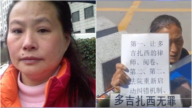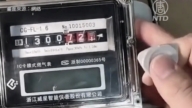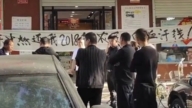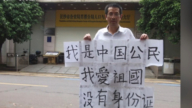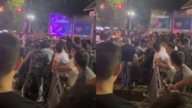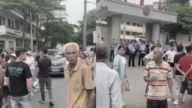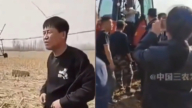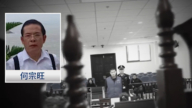【新唐人2011年4月27日讯】上海集卡司机罢工3天后,迫使当局纠正了乱收费和乱涨价行为。罢工司机4月25号返回工作岗位。分析人士认为,这起事件反映了当局对国内局势动荡的担忧,政权的弱化。
上海上千名集装箱卡车司机从4月20号起罢工,抗议高油价和码头的各项高收费,22号,上海市交通运输和港口管理局正式回应,纠正乱收费、乱涨价行为,并宣布取消和大幅调降多项收费。抗议的卡车司机25号结束了罢工,重返工作岗位。
但是,《美国之音》的报导说,在上海货柜卡车司机举行罢工时,当局立即调动大批警察加以镇压,同时实行媒体封锁。
英国《金融时报》对此分析认为,上海港的货车司机举行罢工,并与安全部门发生激烈冲突,这显示出高油价在中国可以造成的政治不稳。
《金融时报》副主编汤姆•米切尔(Tom Mitchell)认为,港口费用和燃料成本的不断上涨侵蚀了上海货车司机们的谋生能力,罢工的行动,明确表现出他们对通胀正在失去耐心。米切尔推断,通胀可能(也将会)继续引发抗议和社会动荡。
而 “中国劳工观察”组织的执行主任对《美国之音》表示:“现在是2011年的物价飞涨,再加上中国现在对持不同意见者、异见人士采用高压的方式,当然它的目地是想为新一代中国共产党的领导人进行过渡,但是采取的这种方式,实际上是把一些问题积累到以后,而且是积累到更严重,不去解决。在这个基础上,我认为它的这种罢工事件会超过去年,甚至比以往每年都要多。”
同时,国际媒体还认为,中共当局面临的局面不容乐观。美国《世界日报》24号的社论指出,中共当局身处两个战场:在经济领域已经开打了一场“通膨遏制战”,在政治上,正打一场“政权保卫战”。
按大陆统计局公布的首季经济资料,三月消费者物价指数(CPI)同比上升5.4%,创32个月来的新高,首季达9.7%,对此,中共不得不展开遏制通膨之战。
《世界日报》社论分析说:在89年爆发六•四运动之前,中国也出现了严重的通货膨胀,这令当局对高通膨仍心有余悸。但依靠行政手段压通膨、稳经济、调结构、扩内需,这些目标不可能同步实现。
在政治层面,当局全面开动专政机器来应对对执政当局挑战的一切萌芽。象尚未成气候的“中国茉莉花革命”,当局已视为外国势力和国内政治异见者合力谋事,以最高规格、高调、多方出手。上到由人大委员长宣布不准搞多党轮流执政等五个“不搞”,下到拘捕“特立独行”的艺术家、作家、维权律师等等。而对宗教界、媒体等的管制,更进一步收紧。
社论还说,执政当局表现得如此慌乱,是因贫富差距、社会治乱等种种问题,令中国社会的矛盾,已积聚到一点就着的地步,而官员队伍的腐败,更令政权基础全面弱化。
学者也认同中共当局政权的“弱化”。在哈佛学生发起六四学术研讨会上,著名的中国问题专家麦克法夸尔表示:“那个政权是脆弱的,否则为何在遥远的突尼斯发生的事情令他们会如此紧张,将艾未未等人抓起来。
新唐人记者宋风、萧宇综合报导。
Shanghai Drivers Strike – A Warning
Three days after the Shanghai truck drivers’s strike,
the Chinese authorities corrected their behavior
of arbitrary charges and price hikes.
Drivers went back to work on April 25.
Analysts believe that this incident is a reflection
of civil unrest and weakening of the government.
Thousands of Shanghai truck drivers went on strike
on April 20 to protest against high oil prices
and port fees. On April 22, Shanghai Municipal
Transport and Port Authority corrected arbitrary
charges and price increase, announcing cancellation
or decrease in a number of charges. On April 25,
truck drivers ended the strike and returned to work.
But according to VOA, when Shanghai truck drivers
went on strike, authorities immediately mobilized
large numbers of riot police and blocked media
from reporting the event.
According to UKs Financial Times, the strike
and clashes with security departments indicate
political instability due to high oil prices in China.
Financial Times vice Editor-in-Chief Tom Mitchell
thinks rising port charges and fuel costs
hurt the livelihood of Shanghai truck drivers.
The strike shows people are running out of patience
on inflation. Mitchell concludes inflation is likely
to continue causing protests and social unrests.
Executive director of China Labor Watch told VOA:
“Sharp price increase in 2011 is coupled
with China’s high pressure toward dissidents,
which was meant to help with transitioning
to the new generation of leadership.
These actions do not help with resolving issues,
but push issues to a later time,
and make them more serious. I think this kind
of strikes will happen more often than ever before."
Meanwhile, international media believe the situation
faced by the Chinese authorities is not optimistic.
U.S. World News editorial pointed out on April 24,
that the Chinese authorities are in two battlefields:
a battle against inflation in the economic field;
and a political battle to “defend the regime."
According to 1st quarter data released by China’s
Statistics Bureau, March consumer price index (CPI)
rose 5.4%, the highest in the last 32 months,
with 9.7% increase only in the Q1.
The Chinese authorities have to carry out a war
to curb the inflation.
According to the editorial article on World News:
“A serious inflation also happened in China
before the Student movement in 1989. This concerns
the authorities a lot. Administrative methods cannot
suppress inflation, stabilize economy, re-organize
the structure and expand internal demand
at the same time.”
At the political level, Chinese authorities utilize
full-fledged dictating machine to respond to any
challenge at early stage. For example, the early stage
Chinese Jasmine Revolution was labeled as
“joint effort of foreign powers and domestic
political dissidents,” and is treated with the highest
alert, high-profile and multiple suppressions.
The chairman of the NPC announced not to allow
multi-party alternation of power. Meanwhile,
arrests of independent and dissident artists, writers,
human rights lawyers and others are going on.
The Chinese authorities have also further tightened
control on religious groups and media.
The editorial also pointed out that the authorities
appear to be very nervous due to the wealth gap,
social disorder and other problems. The social conflicts
in China have reached to the point of explosion.
Corrupt officials also contribute
to the overall weakening of CCP’s political power.
Scholars agree that Chinese regime is “weakening."
China specialist MacFarquhar said during the
June 4th Symposium set up by Harvard students,
“That regime is fragile; why things happening
far away in Tunisia make them so nervous,
and arrest people such as Ai Weiwei.”
NTD reporters Song Feng and XiaoYu


